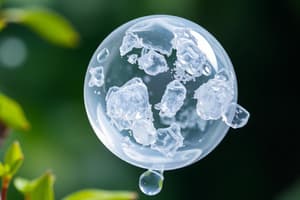Podcast
Questions and Answers
What percentage of the air we breathe is made up of oxygen?
What percentage of the air we breathe is made up of oxygen?
21%
How do oxygen molecules enter our bloodstream?
How do oxygen molecules enter our bloodstream?
Through diffusion in the lungs
What is the primary role of oxygen in our bodies?
What is the primary role of oxygen in our bodies?
To produce energy and allow cells to function properly
Explain why plants are important for maintaining oxygen levels in the atmosphere.
Explain why plants are important for maintaining oxygen levels in the atmosphere.
What are the two main components of the air we breathe other than oxygen?
What are the two main components of the air we breathe other than oxygen?
What are the two main categories in which air pollution can be classified?
What are the two main categories in which air pollution can be classified?
What are some negative health impacts of air pollution?
What are some negative health impacts of air pollution?
How does air pollution contribute to climate change?
How does air pollution contribute to climate change?
What are some examples of gaseous pollutants mentioned in the text?
What are some examples of gaseous pollutants mentioned in the text?
Name one way to combat air pollution mentioned in the text.
Name one way to combat air pollution mentioned in the text.
Flashcards are hidden until you start studying
Study Notes
Understanding Air: Oxygen and Pollution
Air is an indispensable substance that surrounds us, allowing life to flourish on our planet. While air, in its most basic form, encompasses a mixture of gases, this article aims to delve into two significant aspects: the presence of oxygen and the detrimental effects of air pollution.
Oxygen: The Life-Sustaining Gas
Oxygen, a key component of air, is essential for life. Our cells require oxygen to produce energy and function properly. Atmospheric oxygen makes up approximately 21% of the air we breathe, with the remaining gases being nitrogen (78%) and trace amounts of others like argon, carbon dioxide, and water vapor.
The oxygen molecules in air are constantly in motion, and the process of breathing allows us to extract them from the air we inhale. When we breathe in, oxygen enters our lungs and diffuses into our bloodstream. The blood then carries it to our cells where it participates in metabolic processes, producing energy and allowing our bodies to function.
Oxygen is also vital for the health of our planet. Photosynthesis, the process by which plants convert sunlight into energy, requires oxygen as a byproduct. This means that plants help maintain the oxygen levels in our atmosphere, which in turn sustains life on Earth.
Air Pollution: A Threat to Our Health and Environment
Air pollution, on the other hand, occurs when pollutants are introduced into the atmosphere, negatively impacting air quality and thereby our health and the environment. Pollutants can come from natural sources, like dust storms, or be the result of human activities, such as burning fossil fuels, industrial processes, or transportation.
Air pollution can be classified into two main categories: particulate matter and gaseous pollutants. Particulate matter refers to tiny particles suspended in the air, such as dust, smoke, or soot. Gaseous pollutants include chemicals like carbon monoxide, nitrogen oxides (NOx), sulfur dioxide (SO2), and volatile organic compounds (VOCs).
Air pollution has far-reaching consequences for both human health and the environment. Some of the negative health impacts of air pollution include respiratory and cardiovascular diseases, premature death, and impaired cognitive development in children.
Additionally, air pollution contributes to climate change and environmental degradation, affecting ecosystems, wildlife, and the sustainability of our planet. For instance, air pollution can cause acid rain, which harms ecosystems, crops, and aquatic life by altering the pH balance of water bodies. Pollution can also exacerbate climate change by trapping heat and causing the Earth's temperature to rise.
Combatting Air Pollution
While air pollution is a complex issue with many causes and consequences, there are several steps we can take to mitigate its effects and protect our planet.
- Reducing emissions from transportation by shifting to cleaner modes, such as electric vehicles or public transportation, and improving fuel efficiency.
- Implementing cleaner energy sources, such as solar, wind, hydropower, and nuclear energy, to reduce greenhouse gas emissions.
- Improving air quality by strengthening air pollution regulations and enforcing them globally.
- Promoting sustainable land use planning and urban development to reduce air pollution from industrial activities, waste, and transportation.
Protecting our air is essential for the health and wellbeing of humanity and the planet. By understanding the importance of oxygen and the impacts of air pollution, we can take action to ensure a sustainable and healthy future for all.
Studying That Suits You
Use AI to generate personalized quizzes and flashcards to suit your learning preferences.




